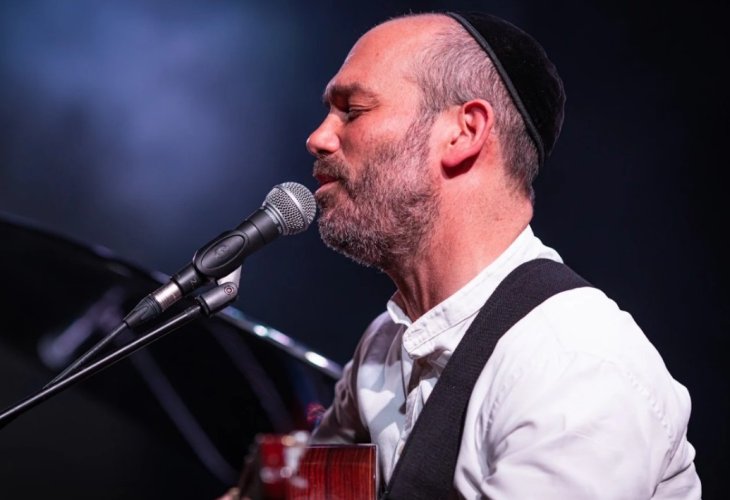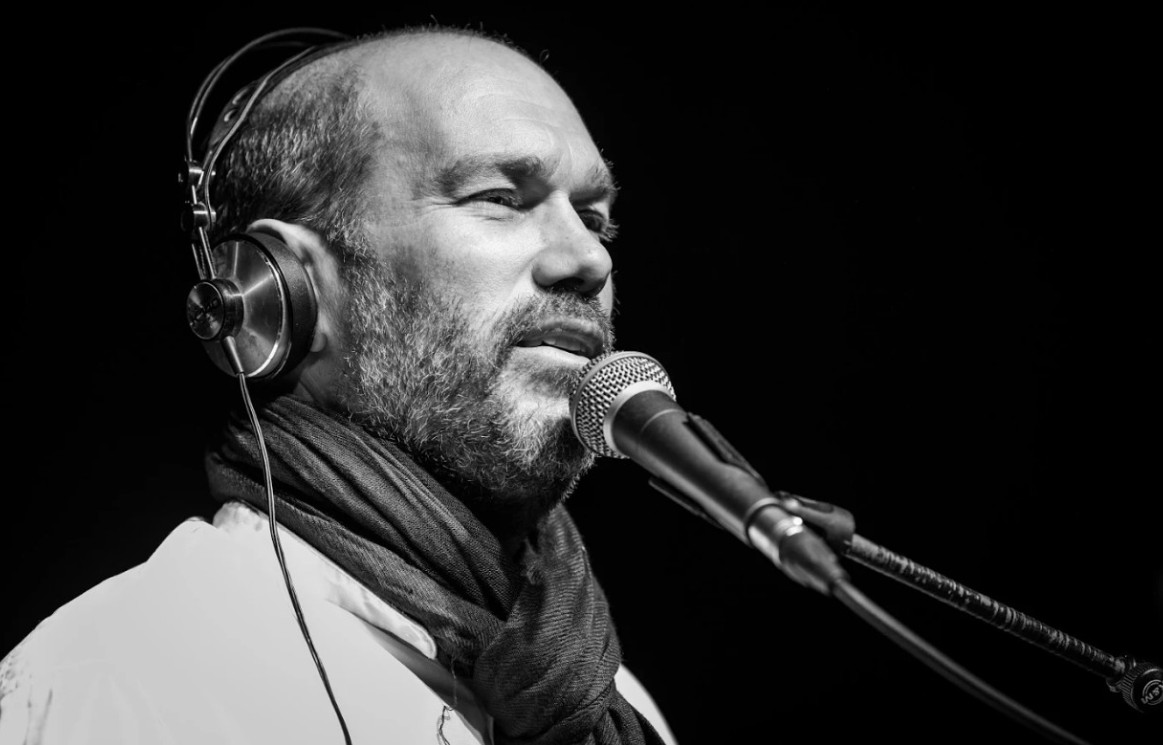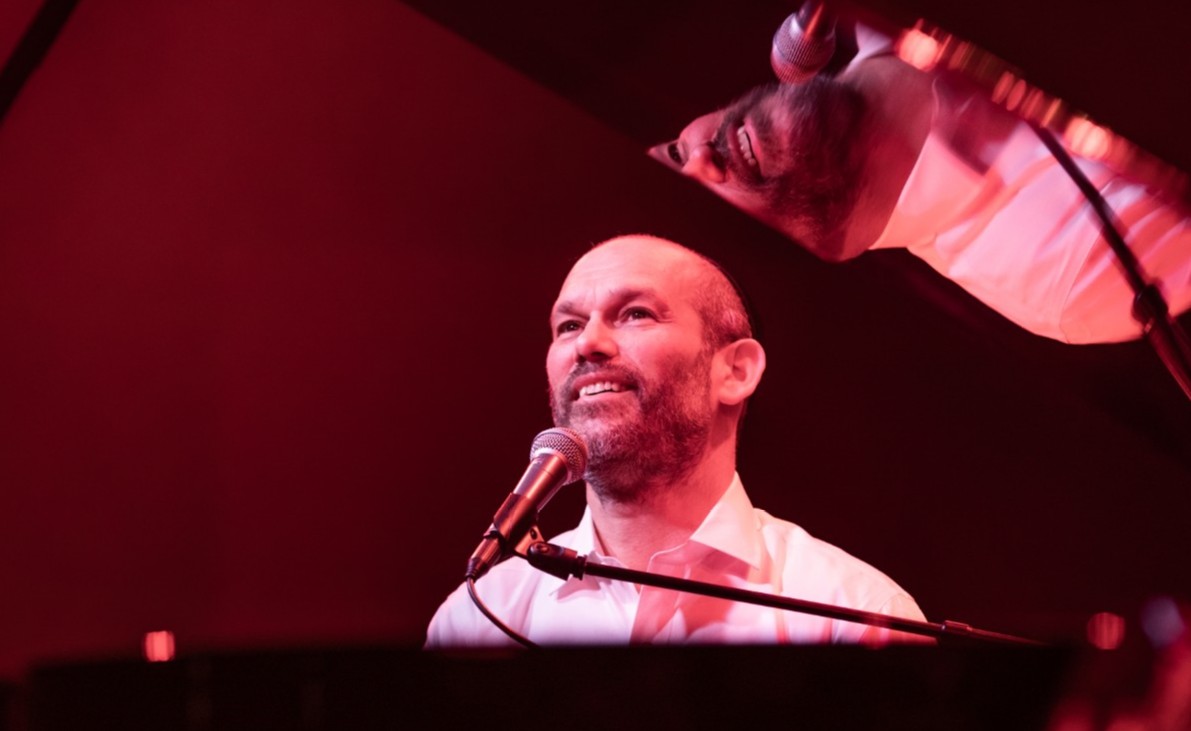Yonatan Razel: "They Say Albums Are Dead, But For Me, That's Not the Case"
Ahead of his new album release, Yonatan Razel shares in an intimate and honest conversation with Avner Shaki about the phrase that struck him in a remote African airport, his days and nights as a shepherd, and why he began composing his songs on a guitar. An interview with a difference.
 Photo: Ohad Romano / Chalamesh Productions
Photo: Ohad Romano / Chalamesh Productions"One of the hardest things about music is the loneliness," Razel confesses while discussing his upcoming album. "That's why I'm always looking for partners. I feel music is like a chavruta (study partner). I love working on my creation with people, playing it for them, getting their feedback. In my first two albums, Evyatar Banai was a significant partner. Alon Yoffe, who has been playing with me for 15 years, was the main partner in the previous album, and I was looking for a partner for the next, fourth album.
"I consulted with Rami Kleinstein; we have a special connection and perform together quite often. He recommended I meet with a young guy named Joni Goldstein, who, despite his young age, has impressive achievements in production and arrangement. Speaking of musical arrangements, I can say that the general direction in the upcoming album is simplicity, minimalism. Not complex melodies. Yet, of course, there is an emphasis on aesthetics and quality".
It takes two to tango, how did Goldstein react to your desire for a minimalist album?
"He actually connected very well, and brought it from within himself. I was really glad Joni connected with this line, and overall—the encounter with him was a meeting with a new generation of musicians. I'm in my 40s, and he's in his 20s. I grew up without the internet. Without a cell phone. It amazes me today to think about it. I didn't even have a mobile phone in the army. Even today, I don't have internet, but I know what's happening in the world. The internet has permeated everywhere. In any case, the meeting with him showed me a model of a new artist. For better or worse. An artist who knows everything, has heard of everything and everyone. On a whim, in an instant, he achieves what he wants.
"For example, in the first single we released, 'David,' there are drums accompanying the song. 120 years ago, a researcher traveled to research the music of the Indians just before they would disappear, and among other things, he recorded some of their songs. When I told Joni about my connection to King David, and the fact that I was a shepherd like him, he recalled hearing those drums once and incorporated them into the song".
 Photo: Ohad Romano / Chalamesh Productions
Photo: Ohad Romano / Chalamesh ProductionsThat's interesting. Tell us about your time as a shepherd. Hopefully with a flute.
"Although I have a strong spiritual side, I'm also a very physical person. However, my physical side doesn't manifest so much. I played music from a young age, and naturally went in those directions. Before the army, I was already in the middle of a composition degree, but I wanted to enlist, so I served as an outstanding musician. After the army, with all the spirit and tunes, I wanted to feel a bit of earth, so I looked for work as a shepherd.
"One day I went to Beer Sheva for some matter, and on the way back to Jerusalem, I picked up hitchhikers. On the way, we passed by Susia, they asked if I prayed the afternoon prayer, I said no. We entered the local synagogue, and I was simply taken aback by this settlement. In the midst of the shock I was in, the guys told me that a farmer in Susia was looking for people to herd sheep. By the way, his name was Yair Har Sinai, and he was murdered a few years later. I went with the offer, and for several months I worked there herding sheep. I was in a period of searching in life, and those hours with the sheep were amazing. I gained a lot from that period. In the end, I even married a girl from a moshav".
The Phrase That Struck Me
Speaking of shepherds, the conversation naturally shifts to King David, who, as known, began his career as a shepherd and ultimately found reins of royalty. "I am very connected to the song 'David,' the first single we released," says Razel. "It stemmed from an unexplained longing for King David. I am eagerly waiting for someone to come like David, who will be a hero, honest, gentle, a servant of Hashem, and possessors of the Holy Spirit.
"Moreover, I feel that this song represents a new language for me. Something I haven't done in the past. For instance, the first two singles we released were composed on the guitar. My natural instrument is the piano, and there I flow best, and one could say that essentially I can't really compose on the guitar. It's not my home. Yet, the guitar has something that brings out different things in me. Sometimes I play it in the evening for the kids, walk around with it at home, and these songs actually came from that place, of evening, of home. Something simpler".
So far you have released an album every five years, now the pace is quicker.
"Yes, there's no set rule. It really is happening faster this time. I believe that between the third and fourth albums there will be about two years. Overall, it takes me quite a while to release songs because I search for my language anew each time. Sometimes I am a bit mute, unsure of how to express what I want. It's a bit like shedding skin, and it takes time. I can't sing what I've already sung. There is something in me that seeks to express differently, and it's not easy.
"Moreover, I feel that the current album is a journey for me. I feel like a person living his regular life in his home in Jerusalem, then appointed as an envoy to the UN in Beijing. He arrives there, settles down, buys a house, sends the kids to school, but knows he will one day return to Jerusalem.
"Speaking of journeys, one of the songs on the album was inspired by a phrase I once read on a wall in a remote airport in Africa. In the past, I performed quite a bit with 'Bird of the Soul,' an organization that identifies Jewish communities with almost zero connection to Judaism and tries to bring them closer. Thanks to this, I had the privilege of experiencing Shabbats and holding special performances in Croatia, Czech Republic, remote towns in America and Africa, and more.
"Regarding Africa, I can say that I had several performances there, and in one of them, I was asked to perform with a local band. The Jewish community wanted me to sing with Africans who live like Bedouins, nomadic. It was very exciting to perform with them, and shortly after, I received a request from non-Jewish Dutch people who wanted me to perform for them, so I flew for a tour in Holland with my trio. It really pleases me that my music is reaching beyond the boundaries of Israel, and I'm very interested in performing in new places, in front of new audiences, etc. Today, through the digital world, reaching new audiences worldwide is more accessible than ever before.
"Returning to that phrase I mentioned earlier, I'll tell you that on one of the trips to Africa, I missed a flight I was supposed to be on, had some time until the next flight, so I wandered around the airport. While wandering, I suddenly saw a phrase inscribed in large letters on one of the walls: 'If you want to go fast - go alone. If you want to go far - go together.' It's an ancient African saying, and it simply struck me. At that time I was still single, and it touched on this point as well. By the way, in the music video for that song, you see a man finding a home, transitioning from loneliness to warmth and love".
 Photo: Ohad Romano / Chalamesh Productions
Photo: Ohad Romano / Chalamesh ProductionsLiving as Ba'alei Teshuva in This Era
"Listen, those words are killer, they really hit," Razel says when I ask about the second single he released, a light version of the familiar hymn 'Simch Benay.' "There are songs that precisely because they are composed, I want to compose them. This song has a classic tune that I love, and I have tried several times to rearrange it in a simpler, more cheerful style. The truth is, this song isn't quite my style, it doesn't have complicated melodies for example. When I played it for Rami Kleinstein for the first time—he was very excited, said it was new and different, and pushed me to release it.
"Indeed, the song fit very well into the new album. Today they say albums are dead, that only singles remain, but for me, that's not the case. I still value albums. For me, an album is a whole story, and each song is like a chapter in a book. If you read just one chapter, you won't get the full picture".
When going for a minimalist, simple album, is there not a fear of falling into superficiality? Shallowness?
"There is definitely that fear. And that's why I constantly tried to ensure that I was going towards simplicity, but not falling into simplism, into a realm with no depth. Thus, I ensured that aesthetically it meets the dignity of artistic standards. However, if we are talking about this, it’s important to say that really, at the root, this is one of the biggest problems in music.
"Art in general, and modern music in particular, gravitated towards complexity and sophistication, but then lost the audience due to too much sophistication, and then they said: 'Let's go back to the audience,' but then lost the art. Therefore, in this regard, my aspiration is to create songs that are both simple and deep. The truth is, in a certain sense, the holy Torah is also built like this. On one hand, there are sphirot and complicated concepts from Kabbalah, complex issues in the Talmud, but on the other hand, you can convey the entire Torah as 'love your neighbor as yourself.' In simplicity and sincerity".
Speaking of the Torah, you've been a yeshiva student learning half a day for quite some years. Does the thought ever cross your mind to abandon music and dive completely into Torah?
"As a kind of ba'al teshuva, the place of maintaining one's trade, one's spirit, one's art, seems very right to me. In the relationship with Hashem, with the Torah, there are ups and downs. Will and return. Sometimes precisely in these periods, music is more significant. And it's so good that it's there. Beyond that, there are several rabbis who guide our family and me on how to live as ba'alei teshuva in this generation, how to maintain joy in life, self-respect, livelihood, etc. My rabbis guide me to continue creating, and I very much want to do so myself".

